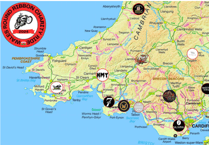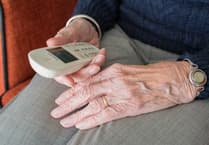A WYEDEAN woman whose life changed in an instant when she had a devastating stroke aged 41 is backing a campaign to raise public awareness that strokes don’t just happen to older people.
Fiona Cooke’s stroke left her with aphasia, a speech and language condition which makes communication difficult, emotional and memory problems, and fatigue.
Her marriage ended, she could no longer cope with her beloved dogs, and she went from being a gregarious, outgoing person to someone who can’t stand noise and crowds.
Fiona, who is known as Fee, is sharing her story to support a campaign by the Stroke Association to make people aware that a quarter of strokes happen to people of working age.
Fee’s stroke, which was caused by a hole in the heart, happened at her home in Coleford in April last year.
“I was just getting ready to go jogging and I must have sat down on the toilet, I don’t know how long for,” Fee said.
“I felt very weird. It was like I was drunk. I tried to stand up. I tried to open the door. I couldn’t move. I don’t know how long for. I couldn’t move my right arm.
“My daughter Holly was home but I couldn’t shout help. I got to the bedroom. It was two hours then my husband came in.”
Fee was rushed to Cheltenham General Hospital where her stroke was diagnosed.
Initially, she couldn’t speak at all and when her speech did start to come back it was faltering and she would struggle for words or use the wrong ones.
“I couldn’t talk. I couldn’t read so I couldn’t decide what I wanted to eat in hospital. I couldn’t use my phone.
“I just wanted to come home. But when I got home, nothing felt right. Everything just felt like a lot of people. People coming to see me. People used to ring and I used to think what are they saying? I couldn’t understand.
“I went to a friend’s where it was quiet. I used to go upstairs to my bedroom. I felt like this isn’t me. I don’t fit in. Two or three people talking and it didn’t make any sense.”
Fee soon realised that her whole life had changed. She could no longer do the things she used to love or cope in social situations and she separated from her husband.
“Before my stroke everything was absolutely fine. I’m different. I don’t know why. I’ve tried to figure it out. I had a lot of friends.
“It changed just like that. I used to run with my dogs. I’m outdoorsy. I used to like to be busy. I couldn’t drink, I couldn’t smoke. This isn’t me any more. My husband liked things that I can’t do any more. We went to Wetherspoons and when we came out, I felt exhausted. It was just loud. It wiped me out.
“I decided that I’m better on my own. I was very selfish at the beginning. I thought I was going to die.”
Fee had two whippets – Blue and Piper – but found she could no longer cope with looking after them.
“I’ve always had dogs. I was very much a dog person. I didn’t want to be near them. I lost empathy. I didn’t want them any more. It was the noise of them. A dog would be too much for me.”
Fee has made new friends and one unexpected consequence of her stroke is that she has lost her fear of flying, travelling to Morocco, Italy, Croatia.
She’s also grateful that her employers, Rothko and Frost, have made adjustments so she could return to work part time as a Warehouse assistant.
“I wanted to be back to normal. I couldn’t drive at the beginning. I just slept a lot. I did three days a week for a couple of hours. I’m now doing 18 hours a week. I was very tired and sometimes I went to sleep at work. I’m lucky with work, they’re a small family firm and they’ve been very understanding.”
Fee’s aphasia continues to be a problem and she carries a card which explains her difficulties to people she meets.
“Talking becomes a lot harder if I get tired. I say a cat when I mean a dog. Is it a boy or a girl? He or she? ‘She’ means everything. I laugh at it luckily. Sometimes how I say things I sound drunk.
“In the middle of a sentence, I’ll swear and don’t know that I’m doing it. It’s awful. I feel bad that I’ve said something but I don’t know I have. I don’t like meeting new people.
“I do understand money if you show me but if someone said ‘a hundred and something pounds’, I don’t know what that is.
“I have to go ‘I’m so sorry, I’ve had a stroke. I don’t understand. Could you do it for me?’
“I’m a lot better now. I’ve got a very good friend and we just talked all the time. but I can’t stand noise. I couldn’t go to a pub because it’s too loud. It’s just me and my daughter Charley at home and I feel so much happier.”
Fee has been supported by the Stroke Association’s Helpline and has taken part in online activities organised by the charity.
The Stroke Association survey, released to mark World Stroke Day on 29 October, showed that over half (60%) of the UK population wrongly believe that strokes don’t happen to young people.
Jackie Cuthbert, the charity’s associate director for the South West and the Channel Islands, said: “Our research highlights that people still think stroke is a condition that only affects older people. It’s crucial that we challenge this misconception and make people aware that stroke affects younger adults too.
“After a stroke, life changes in a flash. Two thirds of people who survive a stroke find themselves living with a disability. As a result, young stroke survivors are having important milestones and their planned futures stolen from them, while they have to learn to adapt to their new life affected by stroke.
“If you know a stroke survivor of any age, visit stroke.org.uk/worldstrokeday to find out more about support available.”



